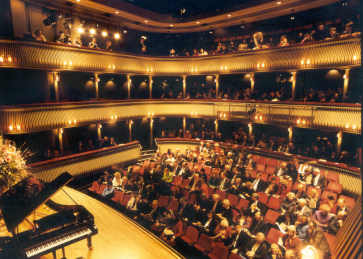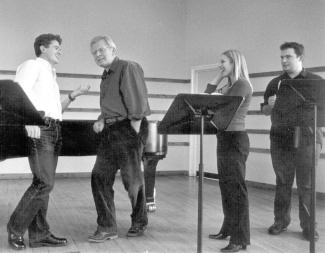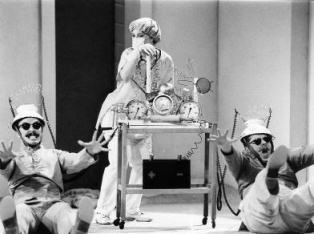The Royal College of Music Benjamin
Britten International Opera School: the
art of nurturing tomorrow’s opera stars.
(ED)
Much as I love recitals and orchestral concerts, there
is nothing quite like a night at the opera to really fire
one up with marvel and enthusiasm for the fact we still
live in age when great performers are to be heard on the
stage. Whilst some might look back fondly to a ‘golden
age of singing’ I celebrate the present and look
forward to the future. Why? Simple, because music is a
living art form that has successive generations to carry
it forward in performance. In recent days the international
musical press has busied itself with comment over the
new production of Tosca at Covent Garden. How could they
have done away with Zeffirelli’s famed and classic
production for that? Is Angela Gheorghiu the new Callas
as Tosca? Obviously not. To compare may be inevitable
but ultimately it is also a mistake: doing so can unreasonably
block the chances of fully recognising qualities in the
new. Nowhere, one can argue, does ‘the new’
matter more on several levels than in conservatoires and
university music departments. These are the nurturing
grounds of tomorrow’s stars.
London has long been blessed as a musical centre, but
even many of those who enjoy the riches it offers listeners
can miss what happens at the young professional level.
(I refuse under any circumstances to use the words ‘student’
or ‘student level’, for this does scant justice
to the highly professional performances to be enjoyed).
For opera during recent seasons I have been drawn back
with increasing frequency to one venue: the Britten Theatre
at the Royal College of Music. This small theatre in South
Kensington, cunningly buried behind the RCM’s brick
facade, is one of London’s hidden gems.

The only custom built opera house to be built in London
since the war, the Britten Theatre is the beating heart
of the Benjamin Britten International Opera School, one
of the foremost training centres for opera singers in
the world. The staff and students form a tight-knit community
in which the overall aims are clear: striving for the
highest standards, professional advancement and the gaining
of much needed experience. To this end the School mounts
up to three fully staged productions a year, with staged
scenes often performed at intervals in between. This is
the face the public sees, but it is behind the closed
doors at other times that much hard work is done.
It is notable that the School’s approach to teaching
is one that builds on tradition. Previous alumni include
the likes of Dame Joan Sutherland, Dame Gwyneth Jones
and Sir Peter Pears. Current Prince Consort Professors
of Singing are Sir Thomas Allen and Sarah Walker, who
complement a teaching staff formed of international standard
operatic artists, amongst whom the British tenor Neil
Mackie, until recently Head of Vocal Studies, is perhaps
most noteworthy. Mackie’s was a ‘hands on’
approach which paid enormous dividends both in the progress
of the singers under his tutelage and the public perception
of the Opera School. It is not just top ranking singers
that give of their time and experience. Conductors (Sir
Colin Davis and Jan Latham-Koenig, for example) and opera
directors such as Paul Curran, Ian Judge and Jude Kelly
regularly spend decent amounts of time in and around SW7.
It was for the Benjamin Britten International Opera School
in 2002 that Sir Thomas Allen made his acclaimed directorial
debut, with Albert Herring.
 <
<
To give the impression that working towards a particular
role or production is all that occupies the time of those
who spend two years completing studies there would be
misleading, even though the major assessment is founded
upon contributions made to staged productions. Support
in becoming a fully rounded professional is an integral
part of the experience, to take them forward into careers
with confidence after graduation.
Diversity of experience also seems key to the ongoing
success of the School. A look back at the productions
mounted since the School’s 2001 launch gives some
indication of this:
A Midsummer Night’s Dream (November 2001,
barely some three months after the launch): Melanie Eskenazi,
Seen and Heard’s London editor commented: “Overall
the best production I have seen this year, since both
direction and singing comfortably upstaged anything from
either of our main houses.”
Oedipus Rex and Gianni Schicci (2002): The Metro,
London’s free daily paper, effused “the vocal
standard is awe-inspiringly high … a knockout evening
of operatic brilliance.”
Die Zauberflöte (2003): Melanie Eskenazi commented
that “one was spoilt for choice in terms of promising
singers to note for future reference.”
The Turn of the Screw (2003): Melanie again: “Michael
Rosewell united the varying strands of the small orchestra
with great subtlety and experience.” I was also
at a single performance of the run, with the ‘B’
cast, I recall. It’s more often than not normal
practice to field two casts, who sing two performances
each. Alas all too few of the press caught this cast.
I felt Simona Mihai’s totally committed performance
as the Governess to be the strongest sung and most vulnerably
acted I had seen to that point, and it is still the case.
A wonderful, if haunting, evening that made my spine freeze
such was the emotional power of the performances.
Dialogues of the Carmelites and The Rape of Lucretia
(2004)
Così fan tutte and Die Fledermaus (2005):
Of the former I wrote in these pages, “Così
fan tutte is a jewel of an opera, and this shone though
due to the contributions of all concerned, confirming
in the process some names to watch out for. Anna Leese
for me headed this list.” Melanie found Die Fledermaus
a “sheer joy, from start to finish”.

What is not mentioned here is that many current School
participants are also to be heard performing at significant
national or international venues with established orchestras
and conductors. Earlier this year, for example, I was
bowled over when I heard soprano Eliana Pretorian sing
Mozart with the OSJ and John Lubbock at Cadogan Hall.
From the intimate confines of the Britten Theatre many
singers find their way with remarkable speed and ease
onto international stages of importance. Some even make
it over the road to the Royal Albert Hall and the Proms,
which shows that a great artistic journey does not have
to be long in distance terms too! Recent graduates include
Sarah Connolly, Jonathan Lemalu, Camilla Tilling, Anna
Leese, Gerald Finley, James Rutherford, Ana James and
Lilli Paasikivi, to name but a few.
The BBIOS’s latest production will open shortly,
a double bill no less that features both of Ravel’s
operas: L’heure espagnole and L’enfant et
les sortilèges. Both are brief masterpieces of
the French twentieth-century repertoire, rich in melody
and material, but for all their artistic merit they are
scandalously under-performed professionally. Conservatoires
take them on with relish, as L’enfant in particular
contains a range of roles that are ideal for singers perfecting
their art. Taking full advantage of the exclusive opportunity
to sit in on a morning of rehearsals, I went along last
week to observe some of the preparation and training that
the young professional cast go through.
First stop, a crowded and busy rehearsal room, where conductor
Michael Rosewell takes the assembled cast through the
ending of L’enfant to the assured accompaniment
of a student repiteteur . With minimal fuss, work begins
at near enough performance tempos on picking up points
from the previous day’s stage rehearsal that did
not quite work. Missed entries here and there or questions
of ensemble balance against the orchestra are dealt with.
Rightly, Rosewell and the language coach emphasise clarity
of text in combination with the musicality of its performance.
In a house as intimate as the Britten Theatre every word
can be heard from every seat. Moments of slight tension
arise – one cast member struggles with his French
accent on a particular line – questions fly, but
never tempers. “Are you in character as trees?”
they are asked at one point. The quick reply comes: “No
we are under the influence of trees”. Opening night
is a week away, but if there are tensions it’s hard
to spot them in this convivial and focussed atmosphere.
After forty-five minutes or so everyone transfers to the
theatre stage. I had been expecting a stage rehearsal
of the L’enfant’s ending, but as can be so
common the plan changed at the last minute. Director Jean-Claude
Auvray, a man of great reputation and no stranger to BBIOS
productions having done two double bills before, wanted
a complete run-through of L’enfant to see how it
worked with the lighting in case alterations needed to
be made. Whilst everyone else readied themselves, Auvray
ran through some details of stage movements with Patricia
Orr, the soprano singing the role of L’enfant. With
minimal set in place the run-through began, with the repetiteur
accompanying again and Rosewell’s confident assistant
conductor on the podium. From my vantage point in the
stalls it goes remarkably smoothly, although some details
still require work. Only on occasion did Auvray intervene
in the stage action, and then just to make slight positional
adjustments so characters are better lit. (It is rather
tempting at this point to run through some notes I made
about the individual singers in their roles, but this
would pre-empt my forthcoming review of the first night.)
Auvray’s comments at the end were brief and focussed,
often to individuals. In itself this showed how much of
a common understanding Auvray had reached with his cast,
some of whom would return that afternoon for a stage rehearsal
of L’heure espagnole. “It’s a work in
progress…” one cast member tells me afterwards.
With that I cannot disagree, but it should be added that
it’s a work that is really coming together.
As I leave, Michael Rosewell comments that L’heure
espagnole is a work that requires “real panache”
in performance, and they’ll need it in some measure
to bring this deceptively challenging work off. The Royal
Opera stages L’heure espagnole next season
under Antonio Pappano, yet for some London audiences it
will be Rosewell and his young professionals that set
the standard. That Covent Garden’s Music Director
has been seen at Benjamin Britten International Opera
School productions in the past means shows he takes them
seriously. Productions of L’heure espagnole
are rare enough; an imminent trip to South Kensington
demands to be made.
Evan Dickerson
The Royal College of Music’s Benjamin Britten International
Opera School present Ravel’s L’heure espagnole
and L’enfant et les sortilèges at the Britten
Theatre, Prince Consort Road on 24, 26, 28 and 30 June
2006 at 7.00pm. Box office: 020 7591 4314. Tickets £5,
£15 and £25.




 <
<